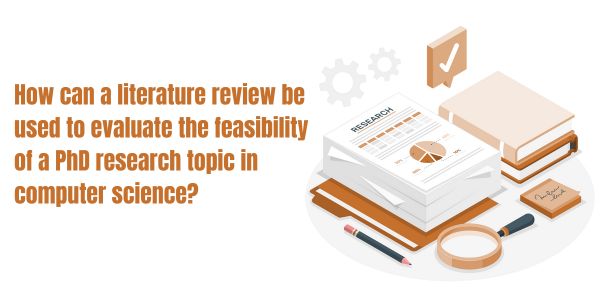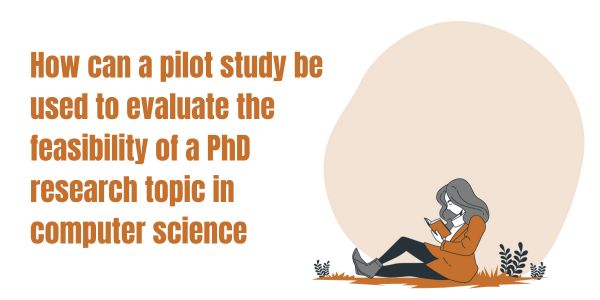As technology continues to advance at a rapid pace, computer science remains a dynamic field that offers a wealth of research opportunities. For those pursuing a PhD in computer science, choosing a feasible research topic is a critical first step towards a successful dissertation. However, the process of evaluating the feasibility of a research topic can be complex and requires careful consideration of a variety of factors, including ethical considerations, potential challenges, and limitations. In this blog, we will explore some key questions and answers related to the feasibility of a PhD research topic in computer science, providing valuable insights for those embarking on this exciting journey. Now it’s getting hard to choose the best PhD Topic Consultation Services. But there are some things you can do such as check their reputation, expertise, service quality, cost, consultation approach and communication.
To develop a framework for evaluating the feasibility of a PhD Research topic in Computer Science, we need to know the steps included to develop the framework through a series of questions and answers. These insights can not only help us to develop the framework but also we can get more in-depth knowledge about the topic so it becomes easier for us to evaluate the feasibility. So, let’s get started.
The first question is What are the key factors to consider when evaluating the feasibility of a PhD research topic in computer science?

When evaluating the feasibility of a PhD research topic in computer science, there are several key factors to consider. These include:
Research question: The research question should be clear and specific, and should have the potential to contribute to the existing body of knowledge in computer science. It is important to ensure that the research question is feasible, relevant, and manageable within the timeframe and resources available.
Literature review: A comprehensive literature review should be conducted to assess the current state of research in the area of interest. This can help to identify any gaps in the literature and provide a foundation for the research.
Methodology: The methodology should be appropriate for the research question and should be feasible within the resources and time available. It is important to consider the availability of data, equipment, and expertise required for the chosen methodology.
Data availability: The availability and accessibility of data should be considered when evaluating the feasibility of a research topic in computer science. It is important to ensure that the data is of sufficient quality and quantity to address the research question.
Funding: The availability of funding should also be considered when evaluating the feasibility of a research topic in computer science. It is important to ensure that there is sufficient funding to cover the cost of data collection, equipment, and analysis.
Timeframe: The timeframe for the research should be feasible and realistic. It is important to consider the time required for data collection, analysis, and write-up.
The second question is: How can a literature review be used to evaluate the feasibility of a PhD research topic in computer science?

A literature review is a critical analysis of the existing literature on a particular research topic. It is an essential component of any PhD research project in computer science, and it can be used to evaluate the feasibility of a research topic in the following ways:
Identify gaps in the literature: A literature review can help to identify gaps in the existing literature on a particular research topic. This can help to determine if there is a need for further research and if the proposed research topic is feasible.
Evaluate the existing research: It can help to evaluate the existing research in the area of interest. This can help to determine the feasibility of the research topic and identify any challenges or limitations.
Identify research methodologies: It also can help to identify research methodologies that have been used in previous research on the topic. This can aid in evaluating the methodology’s viability and highlighting any potential difficulties.
Determine the scope of the research: A literature review can help to determine the scope of the proposed research. This can help to determine if the research topic is feasible and if it can be addressed within the available resources and time frame.
Identify potential research questions: We can help to identify potential research questions that have not been addressed in previous research by using the literature review. It portrays an essential role in identifying the feasibility of a research topic.
Identify potential research contributions: A literature review can help to identify potential contributions that the proposed research can make to the existing body of knowledge. This can help to determine if the proposed research topic is feasible and if it can add value to the field of computer science.
The third question is What are the best practices for conducting a feasibility study for a PhD research topic in computer science?

When conducting a feasibility study for a PhD research topic in computer science, there are several best practices to follow. These include:
Define the research question: Clearly define the research question to ensure that the study is focused and targeted. The research question should be specific, relevant, and feasible.
Conduct a comprehensive literature review: Conduct a thorough literature review to identify the existing body of knowledge on the research topic. This can help to identify potential gaps in the literature and inform the design of the study.
Identify the research methodology: Identify the research methodology that will be used to answer the research question. This should be based on the research question and the available resources and expertise.
Identify the sample size: Identify the sample size required for the study. The sample size should be based on the research question and the available resources.
Identify the data collection methods: Identify the data collection methods that will be used to collect the data. This should be based on the research question and the available resources.
Consider ethical issues: Consider ethical issues such as data privacy, informed consent, and participant safety when designing the study. Ensure that the study is conducted in an ethical and responsible manner.
Pilot study: Conduct a pilot study to test the feasibility of the study design and identify any potential issues or challenges. This can help to refine the study design and ensure that the study is feasible.
Data analysis: Identify the data analysis methods that will be used to analyze the data. This should be based on the research question and the available resources and expertise.
Timeframe: Develop a realistic timeframe for the study. This should include time for data collection, data analysis, and write-up.
Consider resources: Consider the resources required for the study, including funding, equipment, and expertise. Ensure that the resources required for the study are available and feasible.
One of the most important questions is how to choose a PhD research topic. For that, you need to identify your interests, explore the literature, consult with the supervisors, consider the resources, focus on a specific research question and most importantly, ensure that the research topic aligns with your career goals.
Number four in this list is How can a pilot study be used to evaluate the feasibility of a PhD research topic in computer science?

A pilot study is a small-scale version of the proposed research study, conducted to test the feasibility of the research topic and refine the study design. When conducting a pilot study for a PhD research topic in computer science, it can be used to evaluate the feasibility in the following ways:
Refine the research question: A pilot study can help to refine the research question by identifying any issues or challenges that may arise during the study. This can help to ensure that the research question is specific, relevant, and feasible.
Test the research methodology: The study can help to test the research methodology to ensure that it is appropriate and feasible for the study. This can help to identify any problems with the research methodology and refine it if necessary.
Identify potential issues: It can assist in evaluating any potential problems or difficulties that could emerge during the investigation, such as issues with data collection or analysis. This can help to refine the study design and ensure that the study is feasible.
Identify the appropriate sample size: A pilot study can help to identify the appropriate sample size for the study. This can help to ensure that the sample size is appropriate for the research question and the available resources.
Test the data collection methods: The study can assist in testing the data gathering techniques to make sure they are suitable and practical for the investigation. By doing so, it will be easier to spot any problems or difficulties with the data collection techniques and make any necessary adjustments.
Test the data analysis methods: To make sure the data analysis techniques are relevant and viable for the study, a pilot study might help test them. By doing so, it will be easier to see any problems or difficulties with the data analysis techniques and make any necessary adjustments.
The fifth question is What are the ethical considerations to take into account when evaluating the feasibility of a PhD research topic in computer science?
When evaluating the feasibility of a PhD research topic in computer science, there are several ethical considerations that researchers need to take into account. These include:
Informed consent: Researchers should obtain informed consent from study participants, explaining the purpose and procedures of the study, potential risks and benefits, and the right to withdraw at any time.
Confidentiality and data privacy: They should ensure that the data collected is kept confidential and secure, and should follow appropriate data protection regulations and guidelines.
Risk assessment: The Researchers should conduct a risk assessment to identify any potential risks to the participants, the researcher, or the broader community. They should take steps to minimize these risks and ensure the safety of all involved.
Bias and fairness: They should ensure that their study design and data collection methods are fair and unbiased, avoiding any potential conflicts of interest.
Respect for human dignity and autonomy: Researchers should respect the dignity and autonomy of study participants, and ensure that their participation is voluntary and free from coercion.
Minimizing harm: The Researchers should take steps to minimize any harm to study participants, including physical, emotional, or social harm.
Responsible use of technology: They should ensure that any technology used in the study is used in a responsible and ethical manner and that any potential risks are identified and addressed.
Ethical approval: The Researchers should get ethical approval from the relevant authorities, such as an institutional review board or ethics committee, before conducting the study.
The sixth question is What are the potential challenges in conducting a feasibility study for a PhD research topic in computer science?
Conducting a feasibility study for a PhD research topic in computer science can be a complex process that involves various challenges.
Here are some potential challenges that researchers may face:
Identifying the scope of the research topic: It can be challenging to identify the scope of the research topic and determine its feasibility. Researchers need to be clear about their research questions and objectives and ensure that their research is original and contributes to the existing body of knowledge.
Access to resources: Conducting a feasibility study may require significant resources, such as time, funding, and access to equipment or software. Researchers may need to identify potential sources of funding or collaboration with industry partners to support their research.
Identifying appropriate research methods: Researchers need to choose appropriate research methods that can effectively address their research questions and objectives. It can be challenging to identify the most appropriate research methods, given the complexity of the research topic and the available resources.
Recruitment and retention of study participants: It can be challenging to recruit and retain study participants, especially for research topics that involve sensitive or complex issues. Researchers may need to develop effective recruitment strategies and ensure that their study procedures are ethical and respectful.
Ethical considerations: Researchers need to consider the ethical implications of their research, including issues related to informed consent, confidentiality, data privacy, and risk assessment. Researchers may need to obtain ethical approval from the relevant authorities before conducting their research.
Handling data: Collecting and analyzing data can be challenging, especially for research topics that involve large or complex datasets. Researchers may need to develop effective data management strategies and ensure that their data collection and analysis methods are accurate and reliable.
Potential for unexpected results: Researchers may encounter unexpected results or findings during their feasibility study, which may require them to adjust their research questions or objectives. Researchers need to be prepared to adapt their research to new information and findings as they arise.
But if you have still not chosen a research topic, you may get this question about how to choose a research topic for PhD in computer science. Follow all the steps described above, only consider current trends and challenges related to computer science and consider the collaboration opportunities.
Number seven in this list is What are the limitations of a feasibility study for a PhD research topic in computer science?
There are several limitations to consider when conducting a feasibility study for a PhD research topic in computer science. Some of these limitations include:
Limited data availability: Depending on the research topic, there may be limited data available to conduct a feasibility study. This can make it challenging to assess the feasibility of the research and make informed decisions about the research direction.
Unpredictable outcomes: Computer science research can often lead to unpredictable outcomes, making it difficult to accurately predict the feasibility of a research topic. This is particularly true for research that involves developing new technologies or techniques.
Time and resource constraints: Conducting a thorough feasibility study can require a significant amount of time and resources. PhD students may have limited time and resources available to conduct a comprehensive feasibility study, which can impact the accuracy of their findings.
Limited scope: Feasibility studies typically have a narrow scope and may not account for all factors that could impact the success of a research topic. This can limit the ability of PhD students to accurately assess the feasibility of their research.
Ethical and legal considerations: Research in computer science may involve ethical and legal considerations, such as data privacy and security. These considerations can impact the feasibility of a research topic and may need to be addressed before the research can proceed.
The final question in this list is How can the results of a feasibility study be used to inform the design and execution of a PhD research project in computer science?
The results of a feasibility study can provide valuable insights that can be used to inform the design and execution of a PhD research project in computer science.
Here are some ways in which these results can be used:
Identifying potential challenges: The feasibility study can help to identify potential challenges and limitations that may impact the design and execution of the research project. This can help the researcher to anticipate and plan for these challenges in advance.
Determining the scope of the research: Based on the results of the feasibility study, the scope of the research project can be defined. This can include identifying the specific research objectives, the target population, and the timeframe for the project.
Selecting research methods: The feasibility study can inform the selection of appropriate research methods based on the availability of data and resources. For example, if the feasibility study identifies a lack of available data, the research methods may need to include data collection through surveys, experiments, or interviews.
Identifying potential collaborators: The results of the feasibility study may identify potential collaborators who can contribute to the research project. This can include other researchers, industry partners, or organizations with relevant data or expertise.
So, all these questions will help you to develop a framework for evaluating the feasibility of a PhD Research topic in Computer Science. If this doesn’t, then you can comment below so that we can help you with that. Now, there are some important questions to know about.
Finally, what are the latest research topics in computer science for PhD? The latest research topics are being made on Artificial Intelligence, Edge computing, blockchain technology, autonomous system, data privacy and security, natural language processing, computational biology and finally augmented and virtual reality.
And finally, thank you so much for reading this article.





